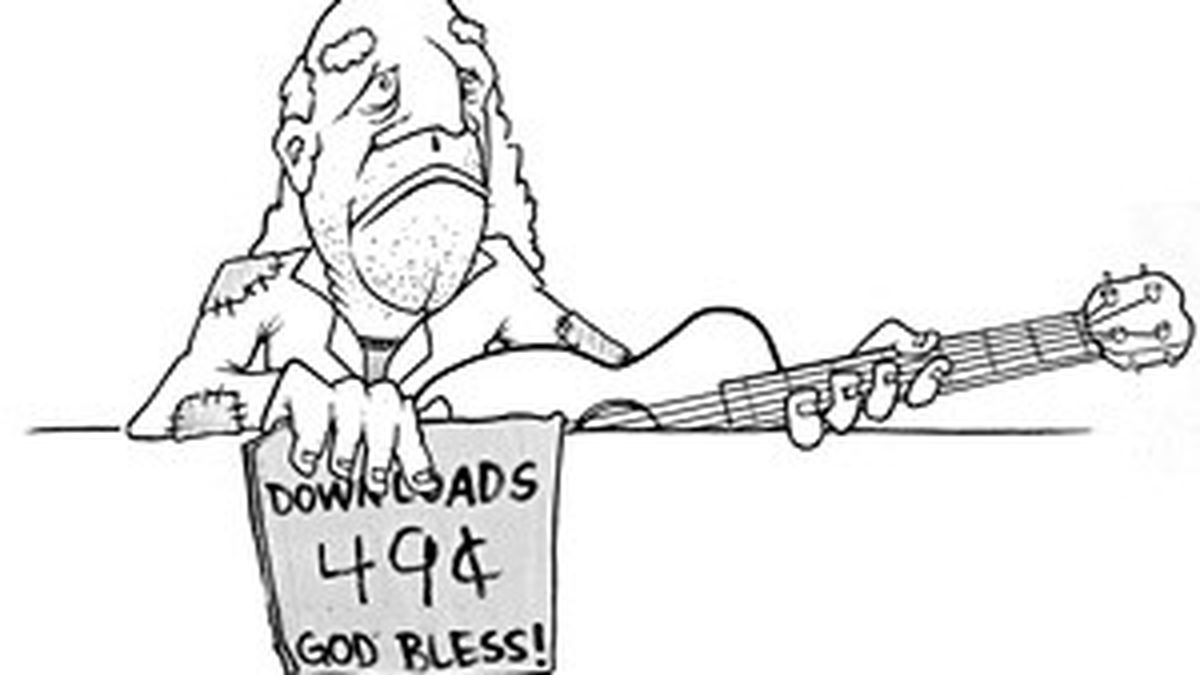If you want to get rich during a gold rush, you don’t go digging for gold. The guaranteed money is in picks, axes, wheelbarrows, and the land deeds that surround the boom. Only rubes sweat out the risk in the hills.
Well, there’s a gold rush going on right now for digital music. Online sales of MP3s continue to grow as iPods reformat the market. Meanwhile, sales of compact discs are down 20 percent since Shawn Fanning let Napster out of the bag in 1999. Perversely, Fanning now sells the tools to the gold rush he helped create.
As of December 2006, hundreds of unsigned bands have started selling their digital music on their MySpace and home pages through the go-between of Fanning’s five-year-old San Francisco startup Snocap.
Simply put, artists upload their music to Snocap’s registry, which generates a piece of YouTube-looking HTML code that even a cow could cut and paste into a band page. When fans go to the artist’s page, they’ll see a little Snocap store, from which they can buy tracks with a credit card.
If the Internet is a seedy shopping mall with one clean iTunes store and a scummy music swapmeet out back, then Snocap offers slick vending machines that artists and fans can stock and install anywhere they want. Artists can sign up for free, and Snocap takes 39 cents from every track they sell.
In a way, the former antichrist of the record biz has become an über-label unto himself by making a bid to sign every unsigned band on Earth, starting with the three million on MySpace. In September 2006, the top user-generated site selected Snocap as its music store of choice. In December, Snocap’s “MyStore” started popping up on MySpace pages. And by the end of 2007, Snocap executive Alex Rofman predicts, the company will have 100,000 MyStores all over the Internet selling anything from Snoop Dogg live cuts to albums from Hayward metal stalwarts Mystic Rage to the works of Oakland rappers Zion-I and San Francisco indiepoppers Birds and Batteries. Even better, fans can cut and paste the same code into their MySpace pages and sell the artists’ music for them.
But after gauging the initial success of such a venture, serious questions remain. Rofman has no comment to inquiries about how many bands have signed up since December, how well they are selling, and whether interest is meeting expectations, except to say that the company is happy with the numbers. Furthermore, he remains predictably mum on a rumored deal with major label EMI to sell its back catalogue via Snocap stores. “That said, we’d be thrilled to work with EMI,” he said.
Moreover, Snocap’s entire business model and service structure remain nebulous to newbies, a marketing problem that’s dogged the company since its early days, when the main goal focused on legitimizing peer-to-peer networks with some kind of payment system, Rofman said. “We never set out to build a consumer brand,” he said, “but the P2Ps had no interest in going legit.”
Turning Snocap’s proprietary music registry toward consumers was the next logical step. “User-generated sites are the new peer-to-peer,” he explained. “They have millions of users, millions of pieces of content. Snocap allows the rights holders to quickly develop a MyStore product in a place where every artist is.”
Mike Sempert of Birds and Batteries became an early adopter in December when a friend who worked at Snocap told him signup was super-easy. He uploaded his trio’s tunes to the registry and spliced the code into his band’s MySpace page and Web site. But Sempert has yet to see a dime because the band hasn’t sold $20 worth to get a minimum deposit into his bank account. “You get what you put into it,” said Sempert, a waiter by day. “We haven’t really concentrated on selling through Snocap, but I think if we did, we’d see more sales.”
As with the old model, the musician isn’t exactly sure of the nitty-gritty details with his distributor. Snocap has nonexclusive rights to Birds and Batteries’ masters in the digital domain, but if the band ever signs with a major, Sempert doesn’t know how a real deal would affect him. “Hopefully the major would have a deal with Snocap to continue distributing it that way,” he said.
They would have to, because Sempert signed a binding distribution license with regard to the uploaded masters. It’ll probably work out, though since Snocap has inked deals with almost all of the industry, from the four majors to hundreds of indie labels, from to the International Online Distribution Agency to iTunes, eMusic, and CDBaby. Many of these companies offer overlapping services to bands like Birds and Batteries.
Almost predictably, a bureaucratic contract cludge is emerging atop the digital music industry that resembles the old cludge of the analogue biz. In that respect, Snocap is well positioned. Instead of two mavericks coding in a garage, Snocap began with a programmer and a lawyer. It has deals with all the six-hundred-pound gorillas of the business, and built a coalition with indie labels before the masses ever heard of it. When this latest gold rush normalizes, Snocap may be among the final keepers of the tools and the infrastructure on which the digital industry runs. No matter who gets rich, they get rich.
But from a musician’s perspective, it seems we’re right back to the old system, with a vague corporation that promises free access and total distribution, all for a modest cut from each track you sell. Never mind all the paperwork: Sign here and start today!
Hmmm.














